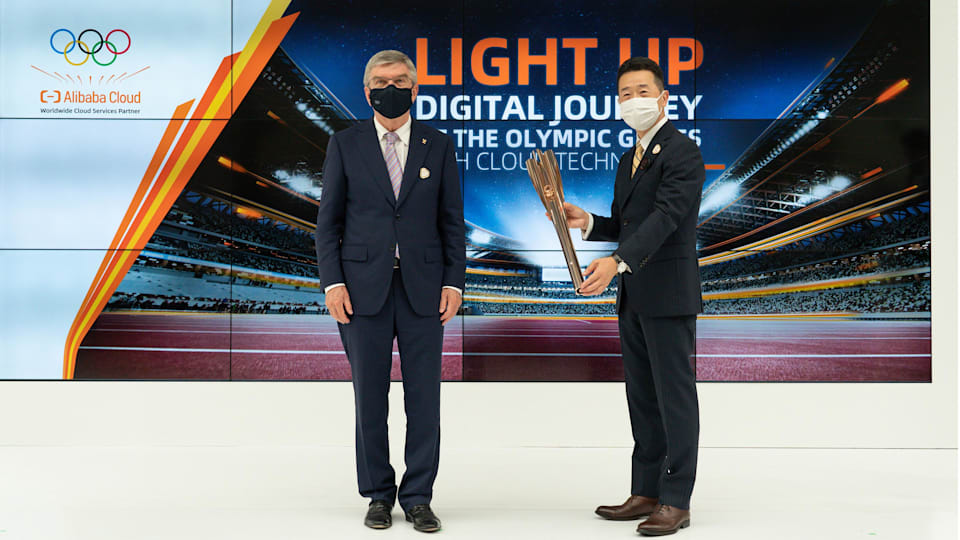Alibaba’s Tokyo 2020 innovations helping transform Olympic Games for digital era
Alibaba is introducing several innovations for Tokyo 2020, as the Worldwide Olympic Partner continues to work with the International Olympic Committee (IOC) and Organising Committees on the digital transformation of the Olympic Games.

As the “Cloud Services” Partner, Alibaba is providing best-in-class technologies to enhance the experience for event organisers, fans, athletes and broadcasters, while as the “E-Commerce Platform Services” Partner, it is also helping the IOC engage and connect with fans seeking official Olympic-branded merchandise.
“Alibaba’s partnership with the IOC goes beyond a traditional sponsorship,” says Alibaba Group Chief Marketing Officer Chris Tung. “We have been working on a variety of cloud and e-commerce-based initiatives as part of our commitment to transform the Games for the digital era. In a little over four years, we’ve already made a strong start.”
Alibaba’s cloud infrastructure and services will play a vital role during Tokyo 2020. Most notably, the company has collaborated with Olympic Broadcasting Services (OBS) on the development of OBS Cloud. This innovative broadcasting platform, which operates entirely on the cloud, allows Rights-Holding Broadcasters to carry out a significant part of their role remotely. With fewer staff and equipment needed onsite, broadcasters are able to dramatically reduce costs and efficiently retrieve, create and distribute Olympic coverage in real time. As a result, the International Broadcast Centre (IBC) in Tokyo is expected to be 30 per cent smaller than it was at Rio 2016, with 27 per cent fewer broadcasters present.
“By leveraging our Alibaba Cloud best-in-class technology, OBS Cloud will help transform the media experience by introducing a more powerful and efficient way for Rights-Holding Broadcasters to create and distribute content around the Games – with fewer staff and equipment required onsite,” explains Tung.
“I would like to thank Alibaba for their great contribution to the magic of the Olympic Games,” said IOC President Thomas Bach, attending the opening of the Alibaba showcasing. “Since the beginning of our partnership in 2017, the Olympic Games and the IOC have greatly benefitted from all the innovations provided by Alibaba in so many areas. From the cloud system to e-commerce, through to 3DAT technology, Alibaba has given the IOC, Olympic fans around the globe and the athletes new opportunities to experience the Olympic Games and the competitions.”
In addition, the media professionals working at the IBC and the Main Press Centre (MPC) can also make social media connections with like-minded broadcasters and media using Alibaba’s first Cloud Pin. The digital wearable (which can be worn as a badge or attached to a lanyard) is designed to enable media professionals to engage with each other and exchange social media contact information in a safe and interactive manner during the upcoming Olympic Games.
Press Conference on Cloud is a media service for journalists working from across the world who would like to watch and download the press conference videos during the Olympic Games remotely. The service includes video processing, audio/video editing and livestream/VOD distribution, and video download function.
With the hot summer in Tokyo, cloud technology is also being used to help keep the working staff safe from getting heatstroke during the Games. Through an intelligent earpiece, Alibaba’s technology helps keep track of body temperature and heart rate. Based on the body temperature, heart rate and environment index, a cloud-based system will identify the level of heatstroke risk in real time for individual working staff. Alerts will be sent to those exposed to a high level of risk, along with recommended precautionary measures – such as drinking more water – to reduce the chances of getting heatstroke. The heat index in the surrounding environment, including temperature, humidity and direct or radiant sunlight, will be monitored through multiple heat stress Wet Bulb Globe Temperature (WBGT) meters set up at 14 Olympic competition venues.
Ahead of Tokyo 2020, Alibaba has also worked with the IOC to launch the first-ever Olympic store on Tmall, China’s largest B2C marketplace for brands and retailers, which is operated by Alibaba. Visitors to the online store can purchase an array of Olympic products and licensed collections, ranging from fashion apparel to pins and other memorabilia. In addition, in 2020, the IOC also launched an official content portal on Tmall to engage with Chinese fans, marking the One Year to Go milestone to Tokyo 2020.
Alibaba is also working with other members of The Olympic Partner (TOP) programme to bring further digital innovations to the Games. This includes partnering with Intel to host the artificial intelligence-powered 3D Athlete Tracking Technology (3DAT) on Alibaba Cloud. This first-of-its-kind broadcast enhancement technology uses AI and computer vision to enhance the viewing experience for fans with near real-time insights and overlay visualisations during the athletics sprint events.
These initiatives are all part of Alibaba’s commitment to helping the IOC transform the Olympic Games experience to be more connected, engaging, secure and efficient for all members of the Olympic family and hundreds of millions of fans around the world.
“We see the partnership as a platform to showcase our innovations to the world, as we pursue our goal of serving two billion consumers globally by 2036,” adds Tung. “More than that, we want to leverage our technology and ecosystem to make a positive impact around the world. Our partnership with the IOC is a 12-year commitment to carry the Olympic Games into a digital era, creating a better experience for all Olympic stakeholders, from organisers, broadcasters and partners to, most importantly, fans and athletes. Alibaba and the IOC share a vision for what technology can do to create a level playing field and to enrich people’s lives. We couldn’t be more excited about the achievements we’ve accomplished together. But there is still much more to do. We plan to continue broadening the range of innovations for Tokyo 2020, Beijing 2022 and beyond.”